Texas oilman helped shape the world
George Herbert Walker Bush was the last US president to serve in World War II.
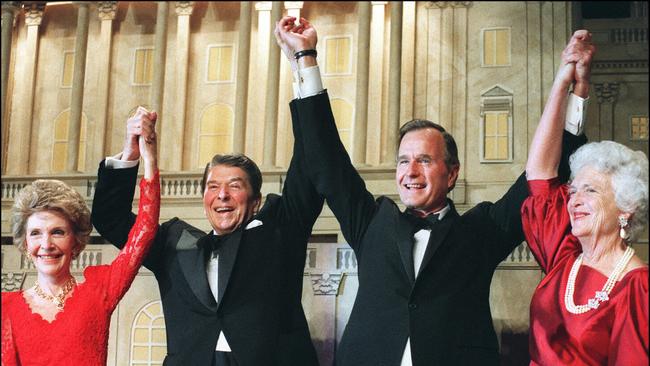
George Herbert Walker Bush led the US to a swift and decisive victory in the first Persian Gulf War and presided over the peaceful dissolution of the Soviet Union and unification of Germany, before a painful recession cost him a second term as president.
He died on Saturday (AEDT) at age 94. His wife of more than 70 years, Barbara, died at the age of 92 earlier this year.
Bush was the last US president to serve in World War II, a fight that helped shape his life and the lives of many in his generation. He went on to build a sterling resume — businessman, member of congress, envoy to the UN and China, head of the CIA — before becoming Republican Ronald Reagan’s vice-president in 1980 and then succeeding him in the White House in the 1988 election.
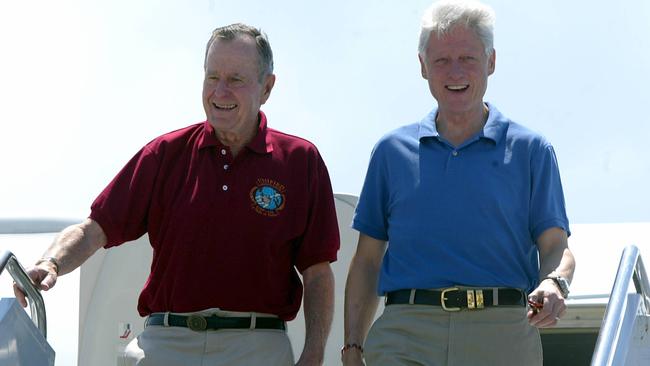
He lost his bid for re-election to Democrat Bill Clinton in 1992, after a campaign in which he was hampered by two years of disappointing economic performance and an insurrection among his own party’s conservatives over a decision to raise taxes.
The loss was a bitter personal disappointment, but one he handled with the kind of grace that allowed him to become friends with Clinton in later life.
In subsequent years, historians have been far kinder regarding the Bush presidency than were voters at the time. Bush also won some degree of vindication when his eldest son, George W. Bush, won the White House in 2000, making Bush the only American since John Adams to be both a president and father of a president.
George HW Bush was born on June 12, 1924, in Milton, Massachusetts. His father, Prescott Bush, was a successful Wall Street executive and, later, a US senator from Connecticut.
The son appeared set to follow his father’s steps from elite prep school to Yale and on to a career in the financial industry when World War II broke out. The younger Bush joined the navy and, when sworn in on his 18th birthday, became its youngest pilot.
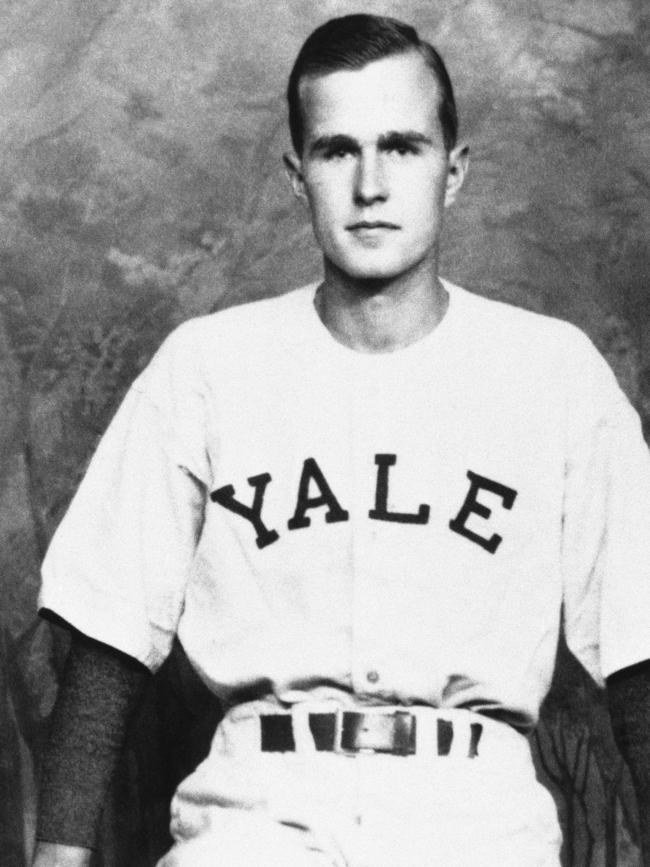
He flew 58 missions in the Pacific, piloting an Avenger torpedo bomber — with his girlfriend Barbara’s name painted on its side — from an aircraft carrier. He was shot down and was rescued by a submarine, a rescue captured in what became a famous bit of grainy film footage. Two other crewmen died; Bush was awarded the Distinguished Flying Cross.
Upon returning from the war, he married that girlfriend, the former Barbara Pierce, and finished his education at Yale, but eschewed the path to Wall Street that his family ties offered.
Instead, with the help of a dose of family money, he moved to Midland, Texas, where he became a businessman in the oil-field supply, exploration and production businesses.
Later, he co-founded Zapata Petroleum, which pioneered offshore oil-drilling platforms.
The Bush family eventually moved to Houston, where he began his political career as chairman of the Harris County Republican Party. After an unsuccessful run for a Senate seat, he was elected to the House of Representatives in 1966 and served two terms.
He then lost another race for a US Senate seat, a defeat that might well have ended his political career, but he was rescued by president Richard Nixon, who named him ambassador to the UN. A series of other top appointments followed, including chairman of the Republican National Committee, envoy to China and director of the CIA.
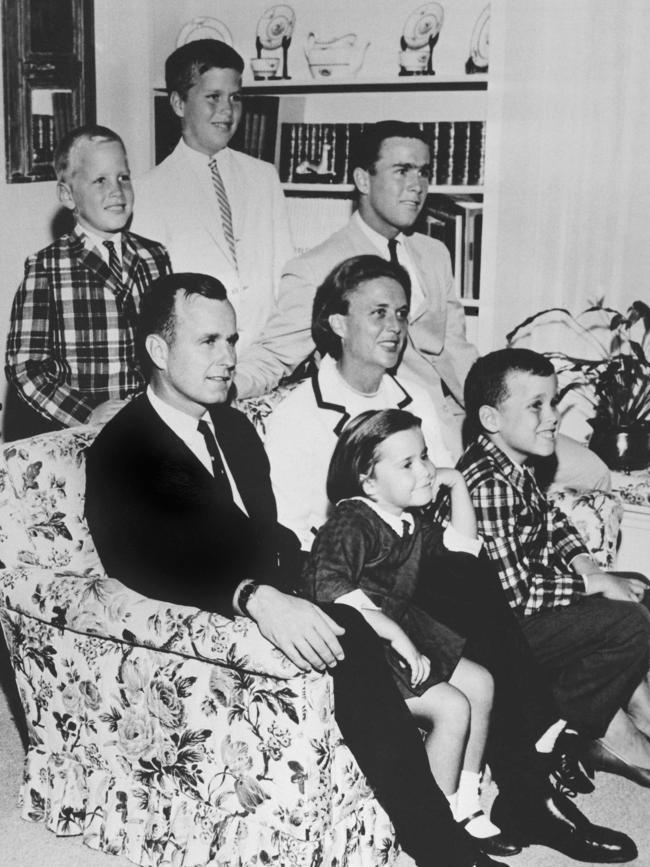
That string of jobs made Bush a sufficiently prominent figure in the Republican Party, and he decided to seek the presidency in 1980. For a time he was the leading contender, particularly after scoring a surprise win in the Iowa caucuses. He had long embraced his father’s brand of moderate Republican politics, and labelled the tax-cut plans of his main conservative foe, Reagan, as “voodoo economics”. But a conservative wave was sweeping the GOP, and it carried Reagan to the nomination. At a dramatic convention in Detroit, Reagan flirted with asking a former president, Gerald Ford, to serve as his running mate, before deciding that wouldn’t be a workable plan. At the last minute, he asked Bush to run with him.
It was a potentially uncomfortable fit, but Bush was unswerving in his loyalty to Reagan. He embodied what former US secretary of state George Shultz called in a memoir “the loyal lieutenant role”, intimately involved in the councils of power and serving as a confidential adviser to the president.
He also left few traces of his own influence. When the Iran-Contra scandal rocked the Reagan administration in 1986, Bush escaped censure by claiming he had been “out of the loop” when decisions were made to trade arms for hostages. He attended so many state funerals that some joked his motto was “You die, I fly”.
Bush’s shining moment as vice-president came in the aftermath of the 1981 assassination attempt on Reagan, when the president lay near death in the hospital and the nation seemed leaderless. While secretary of state Al Haig memorably declared himself “in charge”, Bush slid into place, easing the crisis atmosphere without seeming to pass power to himself.
He ran to succeed Reagan, won the nomination and announced to the 1988 Republican convention that he envisioned a “kinder and gentler nation”.
That was a rhetorical signal of at least a slight shift to the centre after the Reagan years.
But in an effort to deflect scepticism among some conservatives, Bush also declared, “Read my lips: No new taxes”, a fateful promise that came back to haunt and eventually help undo his presidency.
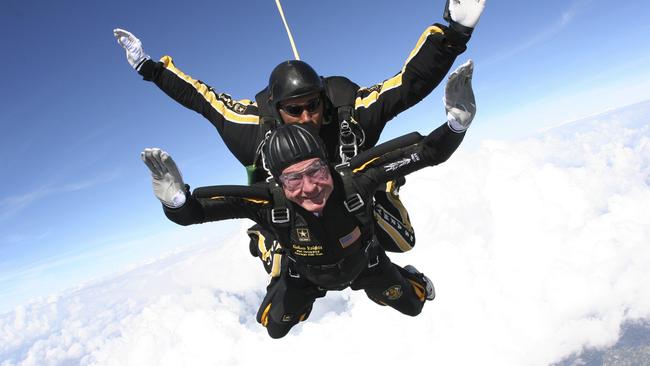
As the economy and the nation’s fiscal condition deteriorated, Bush abandoned the no-tax-hike pledge and signed a tax-raising measure. The decision evoked anger and a sense of betrayal among conservatives and led to a primary challenge from the Right’s firebrand Pat Buchanan. Bush also was hurt by a weak base in Washington; he was only the second US president to serve a full term without party control in either chamber of congress.
Bush was far more in his element on international affairs. After Iraqi strongman Saddam Hussein invaded Kuwait, Bush — aided by his close associates Brent Scowcroft as national security adviser and James Baker as secretary of state — patiently wove a diplomatic and military web that trapped the Iraqi leader and led to a lightning war that successfully drove Iraqi forces out of Kuwait.
When the Berlin Wall fell in November 1989, the Bush administration delicately handled the immediate potentially explosive political fallout among old adversaries and, through patient diplomacy, helped pave the way for a largely peaceful series of revolutions in Eastern Europe that culminated in the collapse of the Soviet Union in 1991.
Bush proved himself willing to use US military might elsewhere. He first took military action in 1989 when he ordered the removal of Panamanian leader Manuel Noriega.
After success in the 100-hour Gulf war, the greatest US military victory since World War II, Bush seemed the captain of an American juggernaut. His approval rating approached 90 per cent. He and advisers began talking about a “new world order” of international equilibrium. But the American electorate turned fickle in the face of high unemployment and a sluggish economy, and Buchanan mounted a primary challenge to his re-election in 1992. He never fully recovered and lost the election to Clinton.
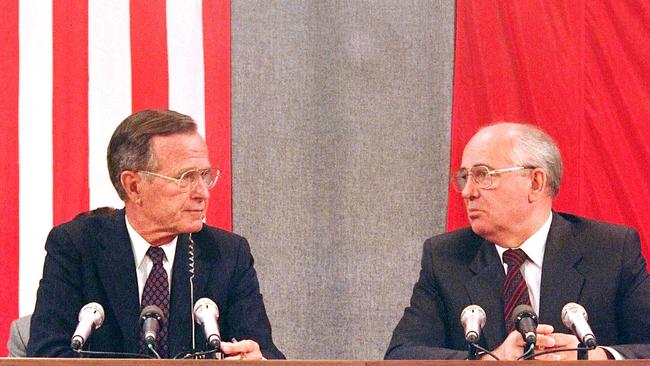
Bush inspired generations of Americans to public service, President Donald Trump said yesterday. “Along with his full life of service to country, we will remember president Bush for his devotion to family — especially the love of his life, Barbara.”
In retirement, Bush undertook a few diplomatic missions and celebrated his birthday into his mid-80s with a parachute jump. He developed post-presidential friendships with former foes, including Bob Dole, a fellow World War II veteran.
And he built a strong bond with Clinton, which began when the two former presidents worked together to raise money for victims of the Indian Ocean tsunami in 2004 and continued as they occasionally joined forces on other projects.
While George W. Bush was elected president and managed to win the second term that had eluded his father, the elder Bush stayed largely in the background. Later, Bush again stayed largely in the background while his wife, Barbara, gave interviews supporting son Jeb Bush’s presidential campaign.
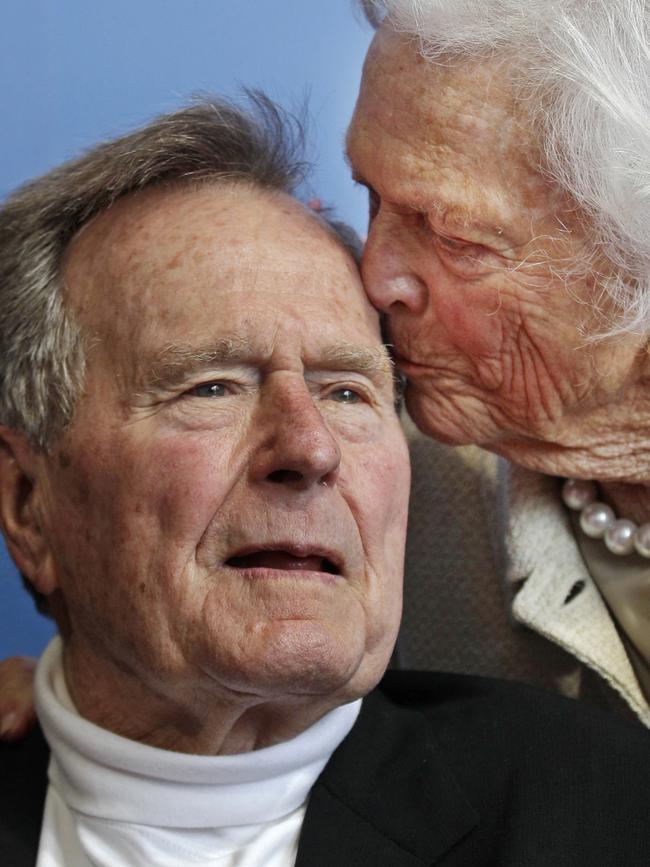
Bush found a way, though, to signal his unhappiness with the man who vanquished his son in the 2016 election, Trump. He stayed away from his party’s 2016 convention.
When Barbara Bush died, Bush’s office described the former president as heartbroken but strong and stoic. Of her passing, Bush said: “We have faith she is in heaven, and we know life will go on — as she would have it. So cross the Bushes off your worry list.”
The Wall Street Journal
George HW Bush. Former US president. Born Milton, Massachusetts, June 12, 1924. Died Houston, December 1, aged 94.
